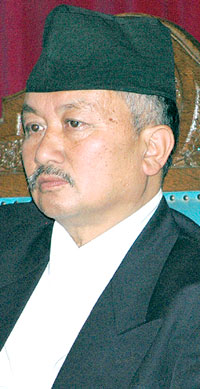|
|
There are many challenges. The situation demands that we face those challenges and move forward.
What are these challenges and goals?
The People's Movement has placed upon us the task of going for a constituent assembly. This has established that the people are the source of the state's power and that sovereignty and self-rule are the people's rights. To convert these words into action we must be able to completely end oppression, restructure the state and establish an inclusive, participatory and democratic rule of law. The People's Movement has clearly determined that the elected representatives must construct a new constitution. This has been accepted by all. The king also accepted this in his statement on 21 April. The House of Representatives has also unanimously declared its commitment to move toward a constituent assembly. The challenge for the House and its Speaker is to see that this actually happens.
Besides passing the proposal of intent, what else is the HoR doing to move towards a constituent assembly?
The HoR will be making a political proclamation to institutionalise the achievements of the People's Movement. This proclamation, which many refer to as Nepal's 'Magna Carta', will bring forth many changes and present a roadmap that the HoR and the whole country can follow to move forward.
Will such a proclamation allow for the amendment of the constitution straight away?
The reinstated HoR is the only official representative of the Nepali people. This is why the HoR can do anything. The makers of the 1990 constitution are united on this. They say that the HoR should immediately scrap that constitution, issue an interim governance act and produce a roadmap for a constituent assembly. During such times it is natural that the HoR should issue a political proclamation and for the people to provide legal acceptance.
Will the Parliament make an announcement that the 1990 constitution has been scrapped?
For now, all the parties in the HoR have agreed to release a political proclamation. There are other things to be done as well. The political parties will stand on this proclamation and do the necessary homework regarding other issues and reach a conclusion.
You said the statement would be issued on Monday. Why was it delayed?
What I said was that such a statement would be made after the next meeting or the one after that. On Monday, the finance minister issued a white paper and said the proclamation would come on Thursday. I am confident that Thursday's session of the HoR will be able to issue the proclamation. Serious groundwork is being conducted on this and it has reached the end stage. The delay has not been caused by any differences in opinion or arguments but because serious homework is being done to fulfil the responsibility.
Will work done on the basis of this 'political decision' and in the absence of any law be liable to challenge in the courts?
Everyone has the right to challenge it. In a true democracy, the citizens' rights must be respected. But the present HoR is the only official representative of the people. If its decisions are challenged, I am confident that the court will see it as the official representative of the sovereign Nepali people. Legal experts say that moving ahead in this manner will eradicate possible reasons for coming to any other conclusion.
The Maoists have demanded that the HoR be dissolved.
The 12-point agreement between the Maoists and seven parties includes the consensus to head for a constituent assembly. But the process was not fixed. The parties said they wanted to move toward the assembly via parliament while the Maoists wanted to do so through a roundtable conference. That is why there is no need to take their demand otherwise.



